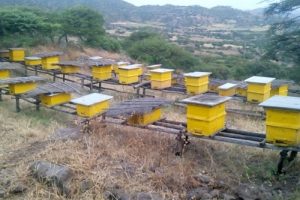
Ethiopia, a large and highly populated country in the Horn of Africa, possesses vast agricultural potential. Fertilizers play a crucial role in maximizing crop productivity and ensuring food security. Through delving into key aspects such as production, distribution, and their impact on farmers and the overall economy, it is important to aim to shed light on the importance of effective fertilizer management and its potential to drive sustainable growth in Ethiopian agriculture.
Ethiopia has made significant strides in domestic or natural fertilizer production. Farmers in different parts of the country have experienced compost or natural fertilizer initiated and guided by agricultural extension workers of the Ministry of Agriculture.
Regarding modern fertilizer, the country has exerted maximum effort to own manufacturing plants though could not be effective for various reasons. It is endowed with all kinds of inputs to manufacture fertilizer but the only challenge is finance and technology. So, the government is inviting investors either local or foreign to invest in the sector using the existing good opportunity of availability of inputs and large market.
On top of this, Ministry of Agriculture has recently announced that maximum efforts have been exerted to provide imported fertilizer for this Meher farming season in Ethiopia. According to Girma Amente (PhD), Minister of Agriculture the government has purchased over 13 million quintals of fertilizer with one billion USD.
Out of the purchased 13.675 million quintals, the last ship loaded fertilizer recently reached Djibouti Port, the minister revealed, adding that over 10.7 million quintals have been transported to the hinterland. More than 200,000 quintals of fertilizer are being transported daily from the port to quickly deliver fertilizer to farmers, Girma stated.
Mentioning some 10.8 million quintals have so far reached for farmers, which is 68 percent of the need, he further elucidated that the Ministry will work to make the purchasing system digital in order to curb illegal trading of fertilizer that is ever growing. The Minister further said that efforts are underway to cover 17.4 million hectares of land with crops in the Meher season.
Ensuring equitable distribution and accessibility of fertilizers to farmers across Ethiopia is a critical aspect of effective fertilizer management. The government has implemented various initiatives to enhance distribution networks, including the establishment of fertilizer warehouses and regional depots. These efforts aim to reduce transportation costs, improve storage facilities, and streamline the supply chain. Additionally, innovative approaches such as mobile technology and e-commerce platforms have been introduced to simplify the procurement process for farmers in remote areas.
Approached by Ethiopian Press Agency (EPA), Amhara Region Agriculture Bureau Head, Hailemariam Kefyalew said the use of fertilizers has had a significant impact on Ethiopian agriculture. Increased fertilizer adoption has resulted in higher crop yields, improved food security, and enhanced farmer incomes. Fertilizers have played a crucial role in mitigating the effects of soil degradation, optimizing nutrient availability, and increasing the efficiency of water and land use.
According to him, various problems have been encountered in the region in particular, and across the nation in general. The lack of peace and stability, along with difficulties in supplying agricultural inputs, including fertilizer, has been major obstacles for farmers in the region. Challenges such as limited financial resources, inadequate extension services, and the need for farmer education also persist. However, the office has undertaken several initiatives aimed at assisting farmers.
“In the past harvest season, a remarkable achievement of producing 160 million quintals of agricultural products has been recorded, with more than 5 million hectares of land cultivated,” he explained. This performance represents a significant improvement compared to the previous fiscal year in the region.
Looking ahead, Ethiopia aims to strengthen its fertilizer supply chain, invest in research and development, and enhance extension services to maximize the potential benefits of fertilizer usage, Hailemariam said. Sustainable practices, including precision agriculture, integrated nutrient management, and soil testing, will be crucial for optimizing fertilizer application and minimizing environmental impacts.
“To optimize fertilizer usage, it is essential to provide farmers with training and education on proper application techniques and dosage. The Ethiopian government, in collaboration with agricultural extension services and development programs, has been conducting training sessions and demonstrations to educate farmers on the correct use of fertilizers. These programs aim to improve farmers’ understanding of nutrient requirements, timing of application, and the importance of soil testing,” he accentuated.
Customized fertilizer formulations tailored to specific crop requirements and soil conditions can enhance agricultural productivity. Ethiopia has been exploring fertilizer blending facilities that allow the customization of fertilizer compositions based on regional and crop-specific needs. This approach ensures that farmers have access to fertilizers optimized for their specific agricultural contexts. By blending different nutrient components, such as nitrogen, phosphorus, and potassium, fertilizer formulations can be tailored to address nutrient deficiencies and promote balanced nutrient uptake.
As to him, collaborations between the public and private sectors play a crucial role in strengthening the fertilizer supply chain and management in the region and the country in general. Public-private partnerships can foster innovation, improve infrastructure, and enhance distribution networks. These partnerships can also attract private investment in fertilizer production, research and development, and technology transfer. Through leveraging the expertise and resources of both sectors, Ethiopia can enhance fertilizer availability, quality, and affordability while fostering sustainable agricultural practices, he noted.
Explaining that the current situation of Ethiopia which is surrounded by different internal and external challenges is understandable, Mekonen Abera an Economist shared the aforementioned idea. Apart from the strong bond between the private and public partnership, he mentioned that regular monitoring and evaluation of fertilizer programs and policies are crucial to ensure their effectiveness and address any shortcomings. These evaluations help identify areas for improvement, refine strategies, and optimize resource allocation.
As to him, addressing the shortage of fertilizer supply and improving management in Ethiopia requires coordinated efforts from the government, private sector, and investors. The government should provide incentives and support for expanding domestic fertilizer production capacity. This can be done through partnerships with private companies, subsidies for fertilizer manufacturing, and investment in research and development for innovative production methods.
Enhancing the efficiency of fertilizer distribution is crucial, Mekonen said, adding that the government should invest in infrastructure development, including transportation, storage facilities, and regional depots. This would reduce transportation costs, minimize losses, and ensure timely availability of fertilizers to farmers across the country. The government should further review and refine the existing fertilizer subsidy programs to ensure their effectiveness and equitable distribution.
Apart from the government’s role, Mekonen emphasized that the Private companies should be encouraged to invest in fertilizer manufacturing plants and importation to supplement domestic production. The government can provide incentives such as tax breaks, streamlined regulatory processes, and access to finance to attract private sector investment in the fertilizer industry.
Furthermore, private companies can partner with research institutions to develop customized fertilizer formulations based on crop requirements and soil conditions. This collaboration can drive innovation, optimize nutrient compositions, and improve the effectiveness of fertilizers for Ethiopian agriculture. Private sector entities can invest in technologies that enhance fertilizer management, such as precision agriculture tools, soil testing kits, and remote sensing techniques, he noted.
“Not only is the government, but also investors responsible for further increasing the effectiveness of fertilizer supply and management in Ethiopia. Investors can contribute by financing infrastructure projects aimed at improving fertilizer supply chain efficiency. This includes funding the construction of warehouses, transportation networks, and storage facilities. Investments in infrastructure would ensure that fertilizers reach farmers in a timely manner, even in remote areas.
Investors can support research and development in sustainable and organic fertilizer alternatives. Funding projects that focus on developing environmentally friendly fertilizers can help minimize the negative impact on soil health, water quality, and ecosystem sustainability. Investors can also play a crucial role in fostering collaborations between the public and private sectors.”
Understanding that Ethiopia’s fertilizer supply and management systems are vital for the country’s agricultural development, collaboration among the government, private sector, and investors is essential to address the fertilizer shortage in Ethiopia. By implementing these recommendations, stakeholders can work together to improve fertilizer supply, management, and accessibility, ultimately supporting sustainable agricultural development and food security in the country.
The positive impact on agricultural productivity, food security, and farmer livelihoods is evident. However, continued investments, technological advancements, and capacity-building initiatives are crucial to address the existing challenges and ensure sustainable fertilizer management. Through prioritizing these aspects, Ethiopia can unlock its agricultural potential and pave the way for a prosperous and food-secure future.
BY HIZKEL HAILU
THE ETHIOPIAN HERALD WEDNESDAY 23 AUGUST 2023





